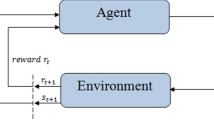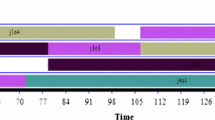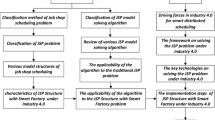Abstract
In this paper, the job shop scheduling problem in a dynamic environment is studied. Jobs arrive continuously, machines breakdown, machines are repaired and due dates of jobs may change during processing. Inspired by the rolling horizon optimisation method from predictive control technology, a periodic and event-driven rolling horizon scheduling strategy is presented and adapted to continuous processing in a changing environment. The scheduling algorithm is a hybrid of genetic algorithms and dispatching rules for solving the job shop scheduling problem with sequence-dependent set-up time and due date constraints. Simulation results show that the proposed strategy is more suitable for a dynamic job shop environment than the static scheduling strategy.
Similar content being viewed by others
References
M. Yamamoto and S. Y. Nof, “Scheduling/rescheduling in the manufacturing operating system environment”,International Journal of Production Research 23(4), pp. 705–722, 1985.
Rong-Kwei Li, Yu-Tang ShYu and Sadashiv Adiga, “A heuristic rescheduling algorithm for computer-based production scheduling systems”,International Journal of Production Research 31(8), pp. 1815–1826, 1993.
S. David Wu, Robert H. Storer and Pei-Chann Chang, “One-machine rescheduling heuristics with efficiency and stability as criteria”,Computers and Operations Research 20(1), pp. 1–14, 1993.
Laurak Church and Reha Uzsoy, “Analysis of periodic and event-driven rescheduling policies in dynamic shops”,International Journal of Computer Integrated Manufacturing 5(3), pp. 153–163, 1992.
D. Sun and L. Lin, “A dynamic job shop scheduling framework: a backward approach”,International Journal of Production Research 32(4), pp. 967–985, 1994.
John E. Biegel and James J. Davern, “Genetic algorithms and job shop scheduling”,Computers and Industrial Engineering 19(1–4), pp. 81–91, 1990.
Haldun Aytug, Gary J. Koehler and Jane L. Snowdon, “Genetic learning of dynamic scheduling within a simulation environment”,Computers and Operations Research 21(8), pp. 909–925, 1994.
Clyde W. Holsapple, Varghese S. Jacob, Ramakrishnan Pakath and Jigish S. Zaveri, “A Genetic-based hybrid scheduler for genetating static schedules in flexible manufacturing contexts”,IEEE Transactions on Systems, Man, and Cybernetics 23(4), pp. 953–972, 1993.
M. Montazer and L. N. Van Wassenhove, “Analysis of scheduling rules for an FMS”,International Journal of Production Research 28(4), pp. 785–802, 1990.
D. E. Goldberg,Genetic Algorithms in Search, Optimization, and Machine Learning, Addison-Wesley, 1989.
Author information
Authors and Affiliations
Rights and permissions
About this article
Cite this article
Fang, J., Xi, Y. A rolling horizon job shop rescheduling strategy in the dynamic environment. Int J Adv Manuf Technol 13, 227–232 (1997). https://doi.org/10.1007/BF01305874
Issue Date:
DOI: https://doi.org/10.1007/BF01305874




